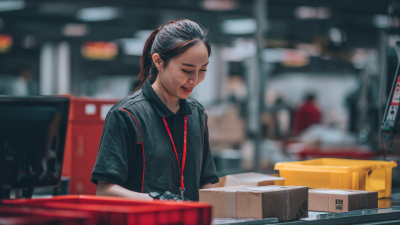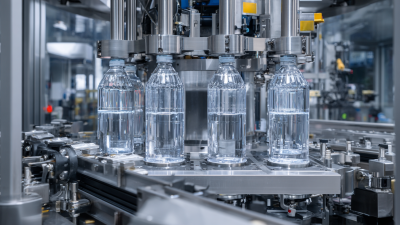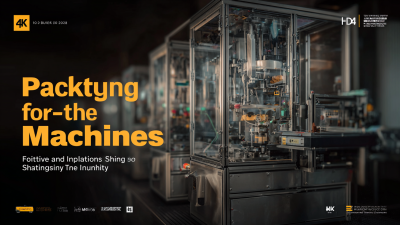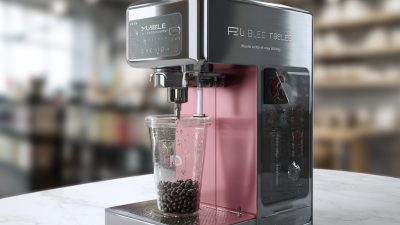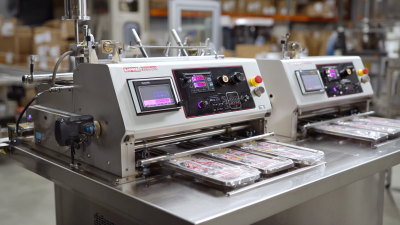Leave Your Message
In today’s fast-paced manufacturing and packaging landscape, selecting the right packing machine is a critical decision that can significantly impact your business operations. With a myriad of options available, from automatic to semi-automatic machines and various technologies tailored for different products, making an informed choice can seem daunting. However, understanding the specific needs of your business—such as production speed, volume, and the type of products you handle—can simplify the selection process. This blog aims to provide a comprehensive guide, blending data-driven insights with expert recommendations, to help you identify the best packing machine that aligns with your operational requirements. By evaluating the features, costs, and efficiencies of different packing solutions, you can enhance productivity and ensure your packaging meets the highest standards. Whether you are a small startup or an established enterprise, the right packing machine will not only optimize your workflow but also position your business for future growth.

When selecting a packing machine for your business, it's crucial to have a clear understanding of your specific requirements. Begin by assessing the type of products you need to package. Different items, whether fragile, solid, or liquid, often require distinct packing techniques and machinery. For instance, food products may necessitate high hygiene standards and compliance with regulatory norms, while industrial goods might focus on durability and sturdiness of the packaging.
Next, consider your operational capacity and workflow. Evaluate the volume of products you intend to package daily, weekly, or monthly. This will help you determine whether you need a manual, semi-automatic, or fully automatic machine. Furthermore, think about the machine's speed and efficiency, as it should align with your production goals without compromising on packaging quality. Understanding these facets of your business requirements will empower you to make a well-informed decision that enhances your packaging process and supports your overall business growth.

When selecting a packing machine, understanding the various types available and their applications is crucial for optimizing your business operations. One popular option is the vertical form fill seal (VFFS) machine, ideal for packaging products like granules or powders in stand-up pouches. This machine operates by forming a tube from a flat roll of film, filling it with product, and sealing the package. Its efficiency and versatility make it a favorite in the food and beverage industry.
Another prominent type is the horizontal flow wrapper, which is typically used for wrapping individual items such as bars of soap or snack bars. This machine is essential for high-speed packaging lines and offers a sleek appearance, which enhances product presentation. Similarly, for businesses focusing on bulk packaging, a case packing machine is suitable, efficiently placing products into shipping cartons or boxes. By evaluating the specific requirements of your products, you can choose the right packing machine that enhances productivity and meets your business needs.
When choosing a packing machine for your business, several key features must be considered to ensure efficiency and productivity. One critical aspect is the machine's speed and output capacity. According to a recent industry report by PMMI, the packaging machinery market is projected to grow by 4% annually, indicating that businesses are increasingly focusing on automation to meet increasing demands. Look for machines that can handle your required production volume while maintaining quality standards.
Another important feature is versatility. The ability to accommodate various package sizes and types can greatly enhance your operational flexibility. A 2022 study from MarketsandMarkets highlights that over 50% of companies value adaptable machines that can switch between different products with minimal downtime. This feature not only saves time but also reduces the cost associated with purchasing multiple machines for different packaging needs.
**Tip:** Evaluate the technology available on the machine, such as smart sensors and automation features. These advancements can significantly improve efficiency and reduce human error in the packaging process. Additionally, consider the machine’s ease of maintenance; regular upkeep is essential for prolonging its lifespan and ensuring consistent performance.

When it comes to investing in packing machinery for your business, understanding the balance between cost and value is essential. Many companies may be tempted to choose the cheapest option available, believing this approach will save them money. However, this view can be shortsighted. Cheaper machines may result in higher operational costs, increased downtime, and ultimately, a lower quality of packaging. It's crucial to consider the long-term implications of your investment and how it aligns with your business goals.
Instead of solely focusing on the initial price tag, assess the total cost of ownership, which includes maintenance, energy consumption, and potential production interruptions. High-quality packing machines may come with a higher upfront cost, but they often deliver greater efficiency, durability, and reliability over time. By prioritizing value, you ensure that your machinery not only meets your current demands but also has the capability to scale with your business as it grows.
Investing in the right packing machine can enhance your operational workflow and provide significant returns in productivity and customer satisfaction.
When selecting a packing machine for your business, evaluating the supplier's reputation and support services is paramount. According to a report by Smithers Pira, an estimated 40% of packing line failures are due to inadequate machine support and maintenance, highlighting the importance of reliable after-sales service. A supplier with a positive reputation in the industry not only provides high-quality machinery but also ensures that technical support is readily available when you need it. Look for suppliers who have been in the industry for a significant period, as their longevity often reflects customer satisfaction and trust.
Moreover, comprehensive support services can significantly reduce downtime and maintenance costs. A study from the Association for Packaging and Processing Technologies (PMMI) indicates that facilities with solid supplier relationships experience a 30% decrease in machine malfunction incidents. This reduction translates to increased productivity and profitability. As you weigh your options, pay close attention to customer reviews, case studies, and the nature of warranties offered. A supplier that invests in robust customer support infrastructure can make a positive difference in your operational efficiency, ensuring that your packing process runs smoothly and effectively.
| Criteria | Description | Rating (1-5) |
|---|---|---|
| Machine Performance | Efficiency in packaging speed and accuracy. | 4 |
| Ease of Use | User-friendly interface and setup process. | 5 |
| Supplier Reputation | Industry recognition and customer feedback. | 4 |
| Support Services | Availability of technical support and training. | 5 |
| Maintenance Requirements | Frequency and complexity of maintenance procedures. | 3 |
| Cost-Effectiveness | Overall value for investment and operational cost savings. | 4 |
| Adaptability | Ability to handle various packaging materials and sizes. | 4 |
